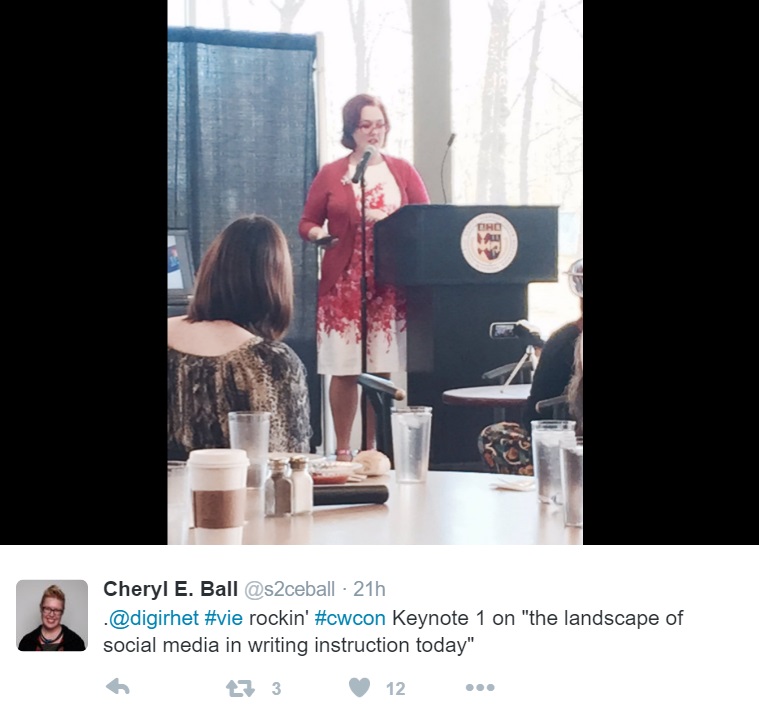Presenter
Stephanie Vie, University of Central Florida
Review
Stephanie Vie began the first keynote address of Computers and Writing 2016 with statistics comparing the use of social media in the classroom ten years ago versus today.
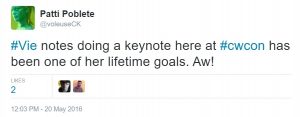
As social media began its ascension into society, only about 10% of college instructors used various platforms. Today 90% of instructors use social media, with YouTube, Facebook, and Twitter in the top three. Whether it’s for class announcements, assignments, or building professional identities, social media is here to stay. At one point in her address, Vie even compared leaving Facebook to the Hotel California—you never leave. Based on her studies, it seems to be the same situation for social media in the classroom.

Vie continued her address with some of the impacts of social media on academia that ultimately translate into some of the top concerns shared by both students and teachers in the classroom. What do we, as instructors, decide to post on social media? What do we decide to take down? What do we decide to make private? Is anything on social media truly private in the first place?
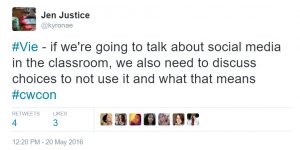
These questions we tackle as instructors who have social media presence are the same questions we should be addressing with our lesson planning and with our students. If we decide to teach with social media, we should be concerned about what students write for our class and the impacts it may have on their futures. Ethically, this requires a lot of work; we have to become more familiar with the way social media privacy works rather than trudging ahead without thinking about it.
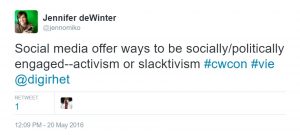
Social media has provided an outlet for people from all over the world to engage in both social and political movements. Vie cited #BlackLivesMatter, #YesAllWomen, and other hashtag movements suggesting that whether we call it slacktivism or digital activism, social media burst into discussions both in politics and academia. It cannot simply be ignored, which hails to Gregory Ulmer’s work with the new electrate world in which we now live. Vie opts for the term Cyber Literacy.
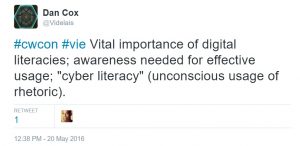
Students write more today than they ever have, moving our society from a literate one to an electrate one. This progression cannot simply be ignored. As scholars, researchers, and instructors, it is our responsibility to be aware of these platforms. We do not need to incorporate it into every class. Vie, as a social media scholar, doesn’t even include social media into every class she teaches, but we should all be aware of its potential.
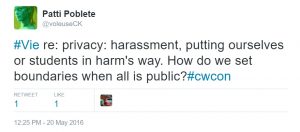
As we look at the potential of social media, we must be aware of its implications as well. Privacy is not the only concern Vie mentioned from her research. As instructors who have an ethical and moral responsibility, we must be aware of the possibility of online bullying and harassment that could compromise more than a student’s ability to get a job. If we decide to use social media in the classroom, we should be prepared to allow students to opt out of the assignment and offer an alternative.
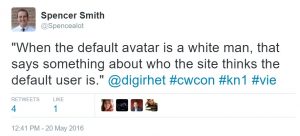
But the use of social media in the classroom is not and should not be our only focus. Vie discusses the rich area of study in social media aside from classroom use: ideologies, design, usability, gender, constraints, exclusion, and so many other topics for study. Social media is not going away. It continues to permeate academia as more and more platforms are created. The final question remains: What will come next?
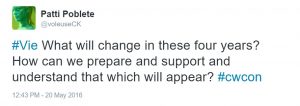
Link to Proceedings
Proceedings are available here

